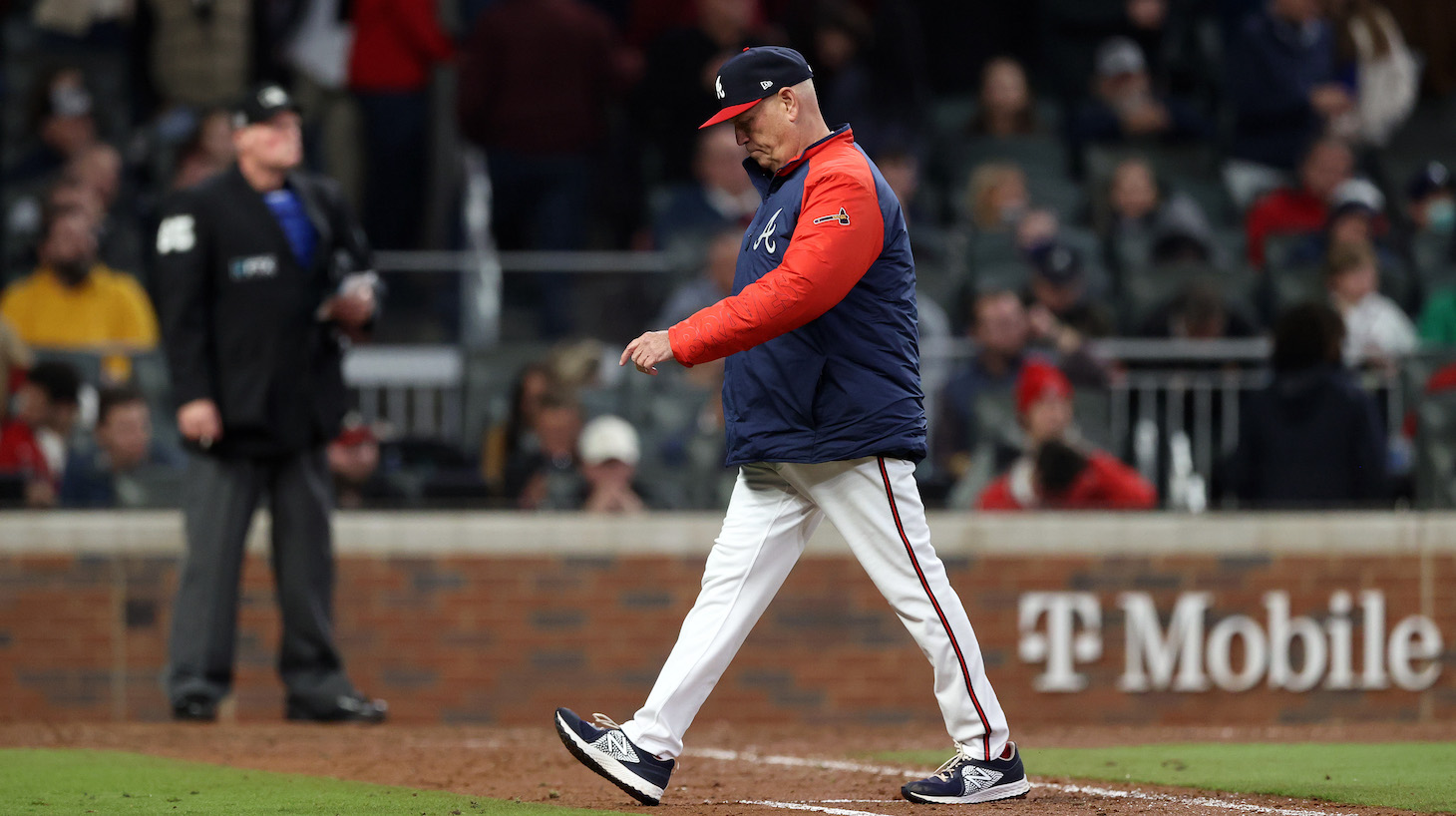This desultory World Series resumes tonight, and if we know anything about the game, it is that it will remain desultory. And long.
On the one hand, it is Game 6, the Atlantii can win the championship and throw champagne at each other's unprotected faces while holding their children and trying not to answer Lauren Shehadi's questions. On the other, it is Game 6, the Houstons can extend the series to a seventh and deciding game, and vogue for the camera while pretending not to answer Ken Rosenthal's questions.
Before that, though, there will be pitching changes, plentiful, hysterical, kneejerk pitching changes, made by shadowy figures you almost never see and ultimately blamed upon managers because too few people understand how baseball works now. Not by inspiration, but by committee. And committeethink is essentially unfun.
There have been an average of almost nine relief appearances per game so far, which I think is a record but am too lazy to research. The starting pitcher in each game has thrown an average of 3.96 innings per game, which we know is a record, down from 4.14 innings in last year's bastardized COVID format and 5.15 innings in the last normal year. The games are filled with beaten-down managers trudging a furrow to the mound and looking concerned while following orders from a committee of people in polo shirts you never see, therefore making it impossible to accurately assign blame when the decision goes to hell. Without rage-fueled blame delegation, the game is incomplete, and thus empty.
Some folks like to complain about the length of games, and yes, all these maneuvers make the games longer, but postseason games started spitting on the four-hour mark when Joe Torre's Yankees and Terry Francona's Red Sox started playing each other, and that was nearly two decades ago. The pace of the game, though, is worse than just “slower.” It is now officially interminable.
It is, in short, a fairly crummy show that no number of talented or entertaining hitters can overcome.
The inherent disdain for the starting pitcher by treating him as just another arm to be tossed on that day's fire has turned every analysis into a treatise on bullpen use. MLB Network and MLB Radio (yes, I listen—don't ask; it's Stockholm syndrome gone mad) have been on all-day alert about Atlanta manager Brian Snitker's limited bullpen choices in Game 6 so as not to overexpose his phalanx of Tyler Matzek, Luke Jackson, A.J. Minter and Will Smith—even though once overexposed, there really is no way to reverse the process and make them underexposed. You're out there, you stay out there.
A bit of this syndrome as it pertains to the World Series is linked to injury—Houston's Lance McCullers and Zack Greinke, Atlanta's Charlie Morton and Mike Soroka, although Soroka hasn't pitched at all this year and it's hard to be fully missed when you've never been there. Far more of it is the new tendency (which is not just Atlanta- and Houston-based) to treat starting pitchers as interchangeable with long relievers and even closers, thereby reducing their value with each added bit of overuse. Game 6 has been analyzed as Atlanta's grand attempt to not use their best relievers so that they have a slightly better chance of being ready for Game 7, if necessary. If that’s not enough to get the kiddos to tune in, I don’t know what is.
Starting pitching is now considered utterly disposable, glorified long relief in all but name. Yes, there are plenty of analytic reasons for this to be defensible, but it also turns every game into repeated referenda on whether a team could run out of pitchers when everyone has 12—if you don't mind starters working on one day's rest and looking like gray meat in their next attempt. See Urias, Julio. Hell, see the Dodgers in general, who used a preposterous seven relievers per game in the National League Championship Series, give or take a limb.
The truth is, when it comes to handling pitching in October, more is not only not better, too much is worst of all. The reinvention of the game comes at the cost of whatever rhythms the sport still possesses, and the most effective starter of the postseason, San Francisco's Logan Webb (two seven-inning starts), has been golfing for two weeks. Instead, it's a steady parade of managers onto the top step of the dugout in the second, out to the mound in the third, and when that seems too deliberative, it's Tucker Davidson sacrificed on the altar of Morton's broken leg, making his second-ever start in Game 5. The quick hook is now baked into the process, and process always tastes of stale pastries and printer ink.
The starting pitcher used to be an acknowledgement of multifaceted skill; it is now a chore to be disposed of as quickly as possible because a starting pitcher on his game does not allow the committee to justify itself. The game's pace is immediately arrested and never regained, because once you've decided a three-inning start is good enough, you've agreed to five more pitching changes.
We're not here to harangue about analytics. Science is generally good, and the math pencils out … well, greedy-algorithms out more often than not. But the third-time-through-the-lineup philosophy is not at issue here because nobody gets to the third time when the average start stops short of four innings. And the game becomes an entertainment slog, as this series has. Indeed, the only thing close to a riveting series this fall was Dodgers-Giants, and that was before the idea of husbanding one's assets collapsed under the weight of too many changes too quickly made by too many people. We kvetched about this series being a referendum between the tomahawk chop and rogue garbage cans, but instead, it has become a series about what team can exhaust its bullpen first, and the answer is, it's a two-way tie for first.
And therein lies the crux. It isn't really the math baseball fans hate, but the fact that in such a setup nobody knows specifically who to blame when the game dips below the water line. Tonight's game begins at 8:07 ET. It will end for starters Max Fried and Luis Garcia shortly thereafter, because, well, the upstairs cabal of people in the polo shirts who manage baseball games will see to it. And they'll be out of camera shot. It demands answers to the questions, "What is baseball without blame? What is second-guessing when the first guessers are invisible?" Fans like to manage games, not player-personnel them. If the managers are just part of a greater hive mind, give us the head of the one in charge. Give us names, damn you, and their hides while you're at it. We have goats we need to scape, and without goats and their scaping, baseball becomes just a thing you do until basketball starts.







